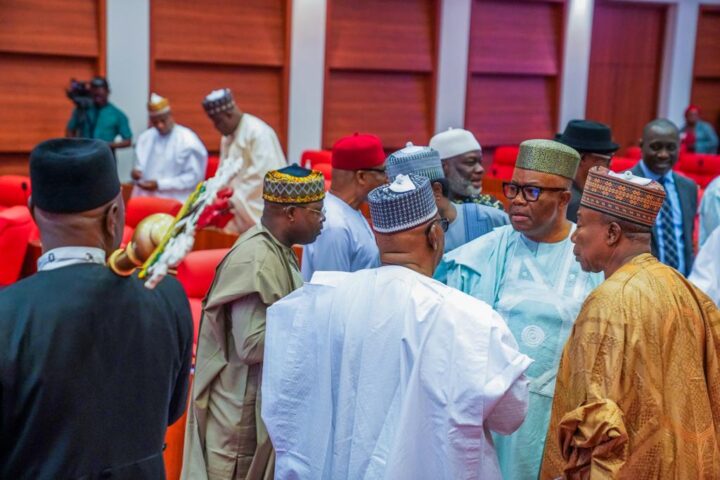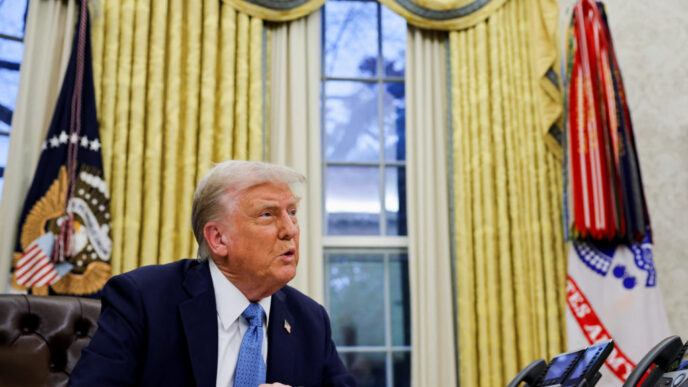Senators after plenary | File photo
The senate has directed the nation’s economic managers to submit a detailed performance report on the implementation of the 2024 budget and expectations for the 2025 capital component within two weeks.
Mohammed Sani Musa, chairman of the senate committee on finance, issued the directive after a 90 minutes closed-door session with Wale Edun, minister of finance and coordinating minister of the economy; Shamsedeen Ogunjimi, accountant-general of the federation; and Tanimu Yakubu, director-general of the budget office.
Musa said the presentation of the Medium Term Expenditure Framework (MTEF) and Fiscal Strategy Paper (FSP) for the 2026–2029 fiscal years would only take place after the committee receives the requested reports on October 23.
“We have heard the position at which the 2024 budget is, and the position of the 2025 budget. And the expectations we are having for the ministry is to, as a matter of urgency, bring the MTEF for 2026 to 2029,” he said.
Advertisement
“The minister has briefed us, and we have collectively agreed that we are making progress, but we need to make more progress.
“We have heard from the accountant-general, we have heard from the director of budgets, where we are with the budgets — the payments that have so far been released, the warrants that have so far been signed, and also the 2025 authority to incur expenditure for agencies to be able to release their capital projects.
“We have agreed that we are making progress. And we expect that, with what Mr President has done just this week, sending a letter to the national assembly requesting for more approvals to loans, the 2025 budget will be adequately taken care of.
Advertisement
“We have all agreed that we will want documented evidence of the performance of 2024, and our expectations for the 2025 budget, before we start talking about the MTEF for 2026.
“The honourable minister of finance has agreed to oblige us to give us that progress report. And we have agreed to reconvene on the 23rd of October.”
Before the committee went into a closed-door session, Edun said the government is recording “high performance” in the implementation of the 2024 capital budget, adding that the 2025 fiscal plan was also on track.
However, Yakubu disagreed, describing the two fiscal years as “turbulent”.
Advertisement
“We have indeed had a turbulent year — one in which most of the assumptions underpinning the 2024 and 2025 budgets turned out differently from projections,” he said.
“Oil revenue, assumed at $75 per barrel, fell short by between $10 and $15 due to global price fluctuations. Inflation also rose beyond projections, affecting borrowing costs and debt service performance, which significantly exceeded targets.
“Furthermore, the unforeseen fiscal implications of the Petroleum Industry Act (PIA) 2022 have compounded our challenges.
“Under the Act, 30 percent of gross oil revenue and 30 percent of oil and gas profits are retained for upstream operations, while the federal government also bears the NNPC’s operating costs.
Advertisement
“This has reduced the federation account allocation by nearly 70 percent of what used to accrue.
“In addition, crude oil output has been lower than projected in the MTEF approved by the national assembly.”
Advertisement
On October 7, President Bola Tinubu asked the national assembly to approve a plan to borrow $2.35 billion in external capital to finance part of the 2025 budget deficit and refinance Nigeria’s maturing eurobonds.
The president also sought approval to issue a $500 million debut sovereign sukuk in the international capital market (ICM) to fund infrastructure projects and diversify Nigeria’s sources of financing.
Advertisement











